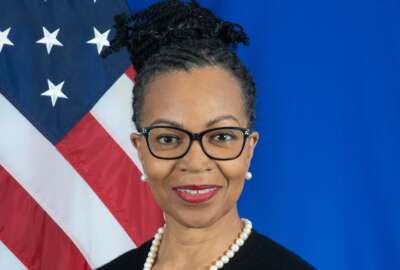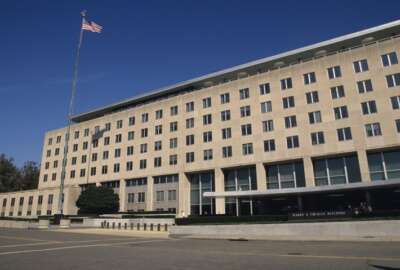

The State Department's Foreign Affairs Information Technology Fellowship is focused on supplying in-demand tech talent to the Foreign Service and diversifying its...
The Foreign Service supports diplomats living overseas and meeting face-to-face with their counterparts from other countries.
But Akvile Kiskis, a State Department information management specialist stationed in Beirut, began her Foreign Service career getting U.S. diplomats comfortable with moving to videoconference platforms during the COVID-19 pandemic.
“They used to meet with contacts in-person, and for a while, they were not able to do that, just because it wasn’t safe to do so,” Kiskis said in an interview.
A typical day can include creating or transferring current online accounts, deleting old ones, and managing the IT hardware. That includes pulling new fiber cables or supplying computers with new backup power supplies to protect against outages that are common in Lebanon.
“Every day is different, and I’m usually on my feet from start to finish, so there’s never like a boring day here,” Kiskis said.
Kiskis joined the Foreign Service through the inaugural cohort of the department’s Foreign Affairs Information Technology (FAIT) Fellowship.
The fellowship began as a pilot in 2017, modeled after more established programs like the department’s Pickering and Rangel fellowships. The department launched the FAIT fellowship with a focus on supplying in-demand tech talent to the Foreign Service and diversifying its ranks.
The Government Accountability Office, in a recent report, urged Secretary of State Antony Blinken to address unmet workforce and diversity recommendations as one of six priority areas.
GAO said the department has taken some steps to address the diversity challenges the auditors have documented over the past 30 years, but GAO said the agency needs to explain and correct a discrepancy in mid-career promotions between racial minorities and their white colleagues.
GAO said the agency should make better use of its workforce data to zero in on the problem. The department hired its first chief diversity and inclusion officer in April.
In its first year, the fellowship accepted five fellows but has since expanded to 15 fellows.
Patricia Boerner, the program manager for the FAIT Fellowship, said the department received its highest volume of applications last year from 97 schools.
“It really shows the commitment of the department to attract highly qualified IT students and award support to populations that have been historically underrepresented in the State Department,” Boerner said.
The fellowship program works with the department’s Bureau of Information Resource Management to select fellows, along with the Washington Center, a nonprofit organization that supports the fellowship through grants.
Taylor Rainey, a graduate fellow and Howard University alumna, said she found out about the FAIT fellowship through her undergraduate advisor after she considered applying for the Pickering fellowship. As she advances in her Foreign Service career, Rainey said she’s focused on making an increasingly digital world more equitable for underrepresented communities.
“It meant a lot to me, just when I met all the other fellows to see what everybody looked like, and getting excited that we are going to be part of the image of what the State Department looks like,” Rainey said.
Carissa Nguyen, a graduate fellow completing a master’s degree in technology management and cybersecurity at Georgetown University, said the fellowship gives her an opportunity to pursue her interests in foreign affairs and IT, while also bringing an under-represented perspective to the IT field.
“Being a woman in IT, sometimes you go into situations and feel that you might have a different management style than what people are used to. You might have a different speaking style [or] communication style, so it’s not so much about being homogenous and trying to mirror what others are doing, but creating a style or a management style, leadership style that works for you,” Nguyen said. “I think it’s important that women know in the IT field that they can be themselves, they don’t need to mirror their male colleagues in order to succeed in order to develop professionally, and I think that’s very important to me.”
Former FAIT fellows now working as information management specialists in the Foreign Service serve as mentors to current fellows. But Enoch Masih, an undergraduate fellow and Northern Essex Community College alumnus, said he’s also gotten support from other fellows in his cohort.
“Each of them had just something special to share with me, whether it was from their career, or just talking about movies. I think all of those things really help in creating a pathway for success, just for me, seeing so many great role models are all around me,” Masih said.
As part of the fellowship’s first cohort, Kiskis interned at the department’s headquarters in Washington, D.C., before moving on to an internship at the U.S. consulate in Frankfurt, Germany.
From there, she went through three weeks of orientation, then six months of training at the Foreign Service Institute. The coursework covered topics ranging from telecoms and encryption to project management.
Kiskis said taking on internships both stateside and overseas helped her and her cohort better understand the points of contact for several crucial headquarters offices.
“Usually when you onboard, you just go overseas right away. There’s a lot of offices in Washington, D.C. and it’s definitely not easy when you have a certain issue to think, ‘OK, which office do I email about that?’ Kiskis said. “It made it, I think, a lot easier for us when we started, rather than for some of our colleagues who didn’t know about that,” she said
The fellowship also helped clear some of the hurdles around obtaining security clearances and helped fellows prepare for the Foreign Service exam.
“It’s not hidden knowledge that it’s not easy to onboard with the Foreign Service — and they’re working on improving that … But FAIT really just took all that challenge away,” Kiskis said.
The pandemic, however, added some unique challenges to the onboarding process. Kiskis arrived in Beirut in March 2020, just a week before Lebanon temporarily shut down its airports as a COVID-19 precaution.
Two weeks into her assignment, the consulate went on “order departure,” which meant all non-essential U.S. personnel were ordered to leave the post. Kiskis, however, the most junior officer at the time, remained on the post.
Many of her colleagues began teleworking, but Kiskis continued to keep working at the consulate.
“We were a skeleton crew because of COVID and the situation in Lebanon. So I definitely had a unique start,” Kiskis said.
Copyright © 2025 Federal News Network. All rights reserved. This website is not intended for users located within the European Economic Area.
Jory Heckman is a reporter at Federal News Network covering U.S. Postal Service, IRS, big data and technology issues.
Follow @jheckmanWFED


